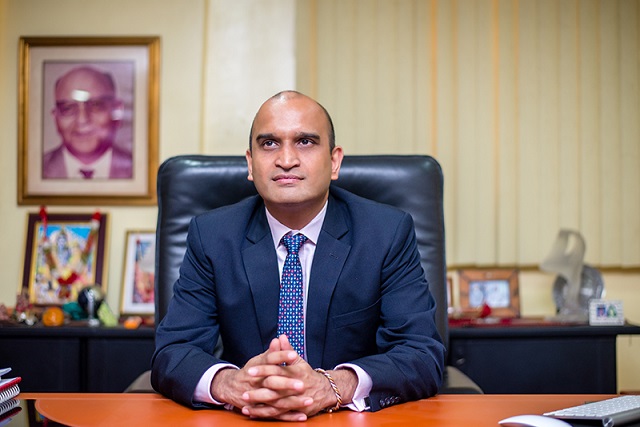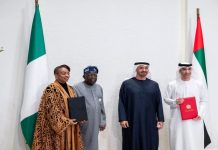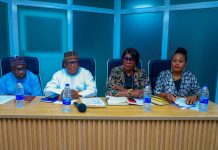The construction of Lekki Deep Sea Port, currently underway, is poised to put a lasting solution to major associated challenges bordering on the development of the maritime sector in Nigeria, create thousands of job for the economy, generate revenue for both the state and Federal government during the 45-year concession of the project.
The Lekki Deep Sea Port is a project that holds much prospect for the growth of the Nigerian economy. It is a port located in Lagos Free Trade Zone, which on completion, will boost the nation’s maritime trade in addition to boosting its ranking in the comity of nations with port development globally. It is estimated that a total number of 170,000 direct and indirect jobs will be created besides helping to boost the Gross Domestic Product (GDP) upon completion.
With the huge potential that underlies the construction of this port to the economy, it is safe to affirm that the future is bright with the berth of Lekki Port in Nigeria.
The port, according to plan, will host three container berths, one dry bulk berth and three liquid berths with a draught of 16.5 metres that will take larger vessels.
Once the Lekki Deep seaport is constructed, it would certainly be a big boost to the nation’s port system, which currently lags behind emerging economies such as Singapore, one of the world’s leading maritime capitals with seven per cent of its Gross Domestic Product (GDP) from maritime, and South Africa, which has a port system comparable to those of developed economies in sophistication, regulation and technology; hence the widespread inefficiencies in the region.
Till date, the cost of doing business at most Nigerian ports place the country as the most expensive owing to a number of factors. This combination of factors include poor infrastructure, inefficiency and corruption. It is absolutely certain that with the completion of Lekki Port, the narrative of Nigerian maritime sector will change.
Given the current state of existing ports in Nigeria, many observers including stakeholders have argued that the sector remained largely untapped stating that the potential harnessed from the sector is at less than five per cent. Though there has been several attempts to revive the sector by past administrations to be at par with global benchmark, the industry is still battling with many problems, which include inadequate financing, deficit in maritime/port infrastructure, inefficiencies in terminal operations, lack of transparency and sharp practices. No doubt, the ports remain the biggest goldmine that can impact greatly on the economy.
Mindful of these challenges and ready to effect significant change, the Federal Government, in 2000, launched out policies that led to far-reaching reforms in the sector. These policies were rooted in the economic objectives of opening up space to increase the participation of private investment and initiative in the economy, thereby promoting a public-private sector-led economic growth
As the economy continues to grow, trade volumes rose and the dependency of the economy on the ports, especially the Lagos ports of Apapa and Tin Can Island, which accounts for 85 percent of cargo traffic, became too heavy.
This economic and infrastructural pressure brought about by rise in trade volume and dependency on ports culminated into the idea of a plan that would see to the development of Greenfield ports along Nigeria’s 853 kilometre coastline to match the country’s trade demand. One of these is the development of a deep seaport in Lekki-Epe area of Lagos State, known as Lekki Port.
Under the arrangement, an International Consortium-Lekki Port LFTZ Enterprise (Lekki Port Investment Holding Inc. (Tolaram Group) holds a 75 per cent equity, while the Federal Government through Nigerian Ports Authority (NPA) and the Lagos State Government, shares the remaining equity at 5 and 20 per cent respectively.
The project, being executed on a Build-Own-Operate-Transfer (BOOT) basis, is under a 45-year concession, with the NPA as its port regulator. This arrangement will ensure that adequate legal and regulatory framework, as well as incentives, would be put in place in line with the concession agreement to avoid inconsistency and policy shifts.
On its part, The Lagos State Government has reiterated commitment to play a huge role in facilitating the ancillary works vital to the success of the port, such as enhancement of road infrastructure connections to the hinterland. To this end, the chaotic situation in the Lagos ports, which has led to huge delays in clearing of goods from the ports and the parlous state of the port roads along the axis, will not rear its ugly head in Lekki Port.
The Chief Executive Officer, Lekki Port LFTZ Enterprise, Navin Nahata, disclosed that one of the unique features of the new facility, is that it would cover a large area, close to 90 hectares, within the Lagos Free Trade Zone.
Besides, he noted that the port will have a draught capacity of 16.5 metres. With this, the country, he explained will now have the capacity to accommodate and berth the biggest vessels, which was currently non-existent at the moment, due to draught constraints.
“At 12.5metres, Apapa port has the deepest draught in the country and Cotonu port, in the Republic of Benin, has 16m- draught capacity. But with capacity of 16. 5 metres, Lekki Port will surely overtake other ports, thus enabling it to take large vessels” he added.
Nahata further explained that the facility would be equipped with the latest super Post-Panamax Ship-to- Shore cranes and RTG cranes, which ensures that it is a modern efficient facility. These infrastructure will guarantee that the initial target of 1.5 million 20-foot equivalent units (TEU) container capacity yearly, expected to hit 4.7 million TEUs, will make Lekki Port the hub destination for many shipping lines in the West African markets, which will combine their destination calls to Nigeria with transshipments.
With these, Nahata believed that Lekki Port is positioned to serve as the economic gateway for the country and the surrounding West African region because the port will offer an opportunity to enter the rapidly- growing market and boosting the neighbouring economies.
Nahata further explained that the development of the Lekki Port would be in phases to meet the burgeoning trade coming from within and outside the country. “It is estimated that about 170,000 direct and indirect jobs will be generating approximately $361 billion during the concession, including over $201 billion in tax revenue to both the state and Federal governments,” he revealed.
A key feature of a modern port is a world-class container terminal. In line with this, Lekki Port recently signed a memorandum of understanding (MoU) with CMA CGM Group, a world leader in maritime transport, to operate its container terminal.
As the container terminal operator, CMA CGM, through its subsidiary CMA Terminals, will be responsible for marketing, operations and maintenance of the container terminal. He said with the latest technology in container’s screening and processing, the port will deliver smooth and efficient movement of goods to and from the site once the commercial activities begin in 2020 to ensure clearing of goods within 48 hours.
Determined to deliver a world-class port facility, the promoter has also engaged two global companies, China Harbour Engineering Company Limited (CHEC) and The Louis Berger Group. While CHEC, the engineering and construction arm of China Construction and Communication Company, was appointed as the Engineering, Procurement and Construction (EPC) contractor,
The Louis Berger Group, United States, one of the largest multi-disciplinary infrastructure consulting firm in the world, was hired as the project’s management consultant. Notably, China Harbour would soon have equity participation in the project, with a certain percentage to be infused soon.
“It is interesting to note that since the project berthed, the Federal Government has found it worthy to share in the success story. In several fora, it has continued to list the project as one that is in line with its Economic Recovery Growth Plan (ERGP), emphasizing that it supports game-changing infrastructure projects directed at making an impact on trade and commerce in the country,” Nahata said.
At the flag-off of the project last year, President Muhammadu Buhari, represented by Vice President Yemi Osinbajo, declared the Federal Government’s commitment to its success, stating that there are enormous economic benefits. And in line with this, the Federal Government recently directed the Nigerian Railway Corporation (NRC), through the Federal Ministry of Transportation, to link all the seaports, including Lekki Port, to railway at the shortest possible time.
Given all that have been discussed, it is clear that upon the completion of Lekki Deep Sea project Nigeria can stand shoulder high to play in the league of globally respected maritime capitals.












